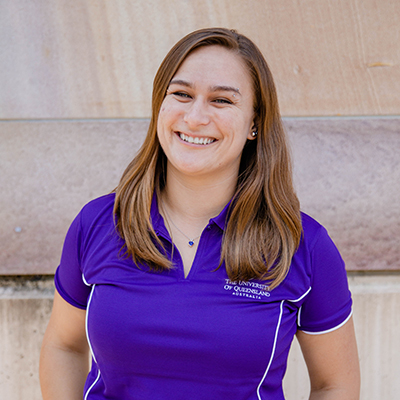Isabel Warner
Give Now Study with us Subscribe
What did you study in your undergraduate degree?
Biochemistry & Molecular Biology, Neuroscience (minor), Sexualities Studies (minor).

Why did you choose IMB to undertake your research?
IMB is a really unique institute in that it brings together a wide range of scientific disciplines under one roof. I care about combatting antibiotic resistance, and at IMB, I can work as a microbiologist, trying to understand the bacteria that cause these infections, alongside chemists, immunologists, and geneticists trying to tackle the same problem from different angles. It’s profoundly powerful to be part of an institute that values multidisciplinary collaboration the way that IMB does, and is, in my opinion, the most effective way to combat the challenges facing our world.
Do you have any tips for future students interested in life science research?
There is no "right" way to do science. Don't be afraid to try, and don't be afraid to make mistakes - it's what makes a good scientist! You're going to get knocked down more times than you succeed, but it's worth it in the end. Similarly, don’t be afraid to ask questions, or to reach out and ask for opportunities – professors and PhD students are just people like you!
Additionally, don't feel like you have to go straight into research. Take time to explore your options, and if you do choose research, that experience will help you get the most out of your degree.
Lastly, surround yourself with supportive people. Good mentors and colleagues will challenge you without putting you down. When things get rough, you'll be glad to have those people in your corner.
Can you please share a quick description of the research you are currently conducting?
"We are heading for a post-antibiotic era, in which common infections and minor injuries can once again kill," according to the World Health Organization. Imagine having an incurable UTI, or dying from a scrape on your knee. That's our reality, if we don't develop new treatments for these infections. Antibiotics work by targeting gene products that the bacteria need to survive. If we find more of these targets, we can develop new antibiotics or combination therapies. My work looks at the genomes of bacteria to identify gene products that are essential for survival, to try to identify these targets for novel antimicrobial development.
What interested you in joining the IMB Science Ambassador Program?
I love getting to talk about my science, and getting to escape the bubble of academia when doing it. Communicating complex ideas to a lay audience (or even other scientists outside the field!) is a fun challenge, and I love hearing people's questions and ideas. Sometimes I even get new ideas for my research from these discussions!
What do you enjoy doing in your free time?
What's that? I'm kidding. I spend my time reading and playing videogames with my friends, or out exploring Brisbane, trying to find the best craft beer on tap. I also volunteer with the Brisbane chapter of Democrats Abroad.
